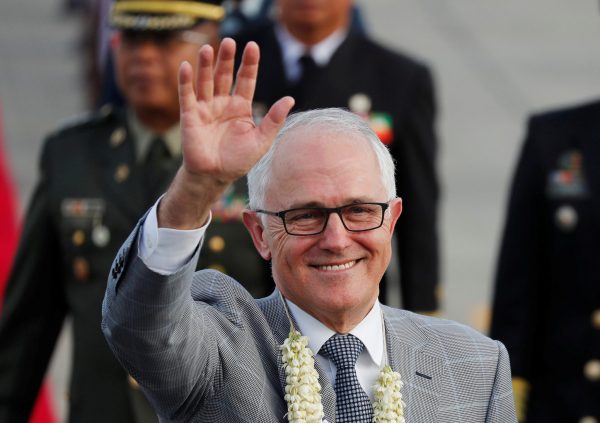It is a masterly exposition of the fluidity and uncertainties in Australia’s diplomatic circumstance today.
For the first time, there is clear official acceptance and disclosure to the public of the diplomatic problems that we confront as regional tensions rise. The White Paper explains in detail, reassuring as its tone may be, that Australia is caught between an unpredictable and perhaps unreliable US ally and an unpredictable and possibly unreliable Chinese partner. It offers few solutions but the franker admission of what the situation looks like is a big step forward.
The economic growth that’s come with globalisation has quickly changed the international balance of power. The United States, which has been the dominant power in the Asia Pacific region since World War II is now challenged by the rise of China. The world is more interconnected than at any other time before. New technologies as well as the transmission of the know-how and scientific knowledge lifts opportunities and prosperity at the same time as it spawns political alienation and the reach of non-state actors who would do us harm. Risks to the global commons demand collective action. These are the big challenges that Australia and its partners now confront.
What’s new is the intensification of the tensions around this change and its corrosion of the pillars on which Australia’s foreign policy is based. If the White Paper had been written when it was initiated well over a year ago, before the election of President Trump, the escalation of the Korean crisis and Brexit’s blow to Europe, it would have had an unquestionably less urgent and less ambiguous tone.
In the White Paper there is no budging on rock-solid faith in the US alliance relationship as the bastion of global rules and its importance to Australia’s navigating new uncertainty. Equally there’s unequivocal statement of the importance of Australia’s partnership with China and acceptance of legitimacy of China’s sharing responsibility and power as well as the reality that (like all great powers) China will seek to influence the region to suit its own interests.
What the White Paper makes clear is that the Australian government and bureaucracy, which have been so closely entwined with the United States in the past, are alarmed by the decline of US military power and influence and Trump’s discarding the conventions of the international economic order. He has abandoned the rules-based system — commitment to abiding by the WTO, the TPP, NAFTA, the Paris Accord and probably its KORUS agreement with South Korea — on which the world has depended to bring order to the global system.
In China’s militarising of the South China Sea and heavy breathing in disputes over territorial issues as well as increasing internal repression and the cult of personality surrounding President Xi, the White Paper sees dangers from the international use of coercive power.
The White Paper’s refreshing frankness is nonetheless folded in a conceptual frame that accentuates the negative response. The paper adopts the Indo-Pacific idea but neither tests nor defines it — except through its footnote definition as a geographic area that touches every continent bar Europe. We know it is a maritime security construct that’s been part of military dialogue for some time. That is one element in responding to the complex problems we now all face — but only one. It is an element that vastly underestimates the complex economic and political interdependence with mainland Asia that Mr Trump in Washington, Mr Xi in Beijing and everybody else in the region has to deal with day by day.
There are other strategies and actions which Australia can take: asserting constructive influence with like-minded countries to persuade both China and the United States that their current courses court danger more than opportunity.
The day that the White Paper was launched, the Wall Street Journal reported escalation of the Trump administration’s plans for trade war. Unchecked, these moves will wreak havoc on the global trade regime — a regime that more than any other rules-based system is the foundation of Australia’s and Asia’s economic prosperity and political stability.
There needs to be an immediate and vigorous response from Asia through conclusion of the ASEAN+6’s Regional Comprehensive Economic Partnership and its calibration as part of an over-arching strategy on global trade to check Trump’s recklessness.
China will not be turned towards reducing security concerns without up-close engagement. The White Paper identifies one important priority: to upgrade Australia’s Comprehensive Strategic Partnership with China. But on how and to what purpose, the White Paper is silent. There’s chance to work with China on Xi’s 19th Party Congress commitment to the multilateral system and a shared community of interests. That is an investment worth the risk.
Yelping from the sidelines is no effective strategy. Delivering regional security and prosperity requires resourcing and developing diplomatic strategies in concert with Asian partners, including China, as the White Paper urges. Strategies that engage China will alleviate concern in Beijing by those who read the White Paper as an attempt to contain it.
The temptation of some subsequent government will be to tear this document up, like the current government discarded the Asian Century White Paper, expunging Asia from its diplomatic lexicon and short-changing Australians.
That would not be wise.
Both the robust narrative and the more fragile conceptions of how to deliver Australia’s prosperity and security in the White Paper invite serious debate. It would be unfortunate if partisan disputes (not least between the more unthinking supporters of the United States and China) resulted in the paper’s being sidelined or ignored in future policymaking.
Peter Drysdale is Emeritus Professor, Head of the East Asian Bureau of Economic Research and Editor-in-Chief of East Asia Forum at the Crawford School of Public Policy, The Australian National University.

